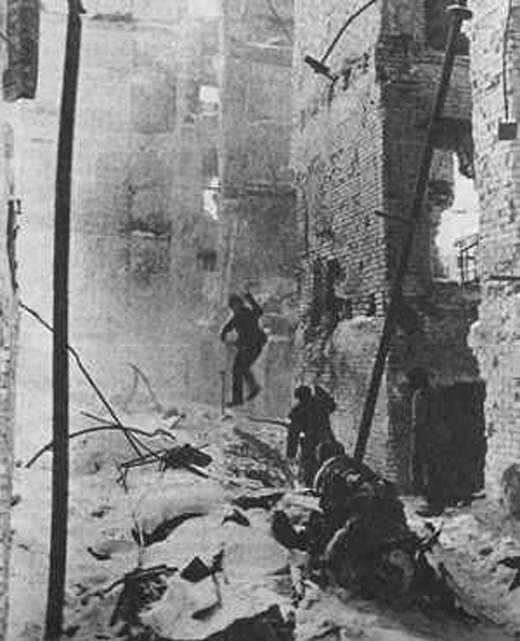Air Operations, CBI
BURMA6 11th Medium Bomb Squadron B-25s attack storage facitlies at Bhamo while 23rd Fighter Group P-40s bomb and strafe transportation targets.
[Air Operations, Europe
BOMBER COMMANDEvening Ops:
- 3 Mosquitos of the Pathfinders, now officially designated as No. 8 Group, and 38 Lancasters of 5 Group are sent to Duisburg.
- 3 Lancasters are lost.
- 73 aircraft lay mines off the Danish and German coasts.
- 2 Lancasters are lost.
Air Operations, New Guinea
5th Air Force and RAAF fighters and bombers attack the Japanese convoy unloading at Lae, but more than 4,000 Japanese Army ground troops and their equipment and supplies are landed. P-38s of the 39th Fighter Squadron, 35th Fighter Group, down 4 Ki-43 'Oscar' fighters over Lae at 0810 hours, 5 more 'Oscars' over Lae at 1435 hours, and 3 A6M Zeros and 4 'Oscars' over or near Lae at 1800 hours.
[Air Operations, Tunisia
- XII Bomber Command B-17s attack the naval base at Bizerte and the port facilities at Ferryville.
- XII Bomber Command B-26s attack Kairouan Airdrome.
- XII Bomber Command B-25s attack bridges and rail lines at Graiba and Kalaa Srira.
- XII Fighter Command A-20s and P-40s attack German Army tanks near Gabes.
- IX Bomber Command B-24s attack Tunis after being diverted from their primary target, Bizerte, by bad weather.
- While escorting and supporting various bombing missions, fighter pilots of the 1st, 14th, 33rd, 52nd and 82nd Fighter Groups down a total of 8 Luftwaffe fighters.
Battle of the Atlantic
U-124 attacks the 12-ship Rio de Janeiro, Brazil-bound Convoy TB-1, torpedoing the US tanker Broad Arrow (7718t) and the US freighter Birmingham City (6194t). 7 of the 8-man Armed Guard are killed on the Birmingham City from the attack. Her complement abandons the blazing ship as she sinks in three minutes.
[CBI
Chiang Kai-shek notifies President Roosevelt that the Chinese army will not undertake offensive operations in the spring of 1943.
[China
Chiang Kai-shek sends a message to Roosevelt turning down the suggestion that he should launch a big offensive in the coming spring.
[Eastern Front
Gen Konstantin K. Rokossovsky, commanding the Don Front Armies besieging Stalingrad, and Gen Nikolai N. Voronov, the Stavka representative, issue a summons to surrender to the Germans. Von Paulus' sense of resistance is stiffened by his chief of staff, Gen Arthur Schmidt, a convinced Nazi, and he ignores the demand. In terms of manpower the German defenders are if anything superior, but the Russians are well fed and clothed and have adequate supplies of fuel and ammunition. The Germans have virtually nothing and are already weakened by hunger and cold. Farther south Zimovniki, on the railway line from Stalingrad to Novorossiysk, falls to Russian attacks. The threat of isolation becomes more real for von Kleist's Army Group A in the Caucasus.
SOUTHERN SECTORRokossovsky offers surrender terms to Paulus at Stalingrad. His terms are generous on paper. 'We guarantee the safety of all officers and men who cease to resist, and their return after the end of the war to Germany or to any other country to which these prisoners of war may wish to go. All personnel who surrender may retain their military uniforms, badges of rank, decorations, personal belongings and valuables and, in the case of high-ranking officers, their swords. All officers, noncommissioned officers and men who surrender will receive normal rations.' Hitler forbids any surrender Those Germans who did surrender after the fall of the city would find their captors in a less generous mood.
Russian Infantry in the Ruins of Stalingrad |
 |
Guadalcanal
Gen Collins issues his first field order to the 25th Div concerning the coming offensive. The 35th Infantry secretly moves up Mount Austen toward the line of departure.[MORE]
[Madagascar
Gen Sir William Platt passes over responsibility for the whole island, except the area of Diego Suarez which has been made into a very important air and naval base for the British, to Gen Legentilhomme, High Commissioner for the French possessions in the Indian Ocean, which are loyal to the Free French.
[Mediterranean
British Force K, 2 cruisers and 4 destroyers, harries the last convoys between southern Italy and Tripoli. 14 ships of all sizes are sunk during the nights between January 8 and January 20.
[New Guinea
Units of the American 127th Inf Regt take the village to Tarakena, while the 163rd Inf opens the offensive aimed at dislodging the enemy from the Sanananda road. Meanwhile, despite Allied air raids, the Japanese land about 4,000 men and materials at Lae.
[North Africa
TUNISIACombat Command B, US 1st Armored Div, is detached from V Corps, British 1st Army, and reverts to the US 1st Armored Div.
[